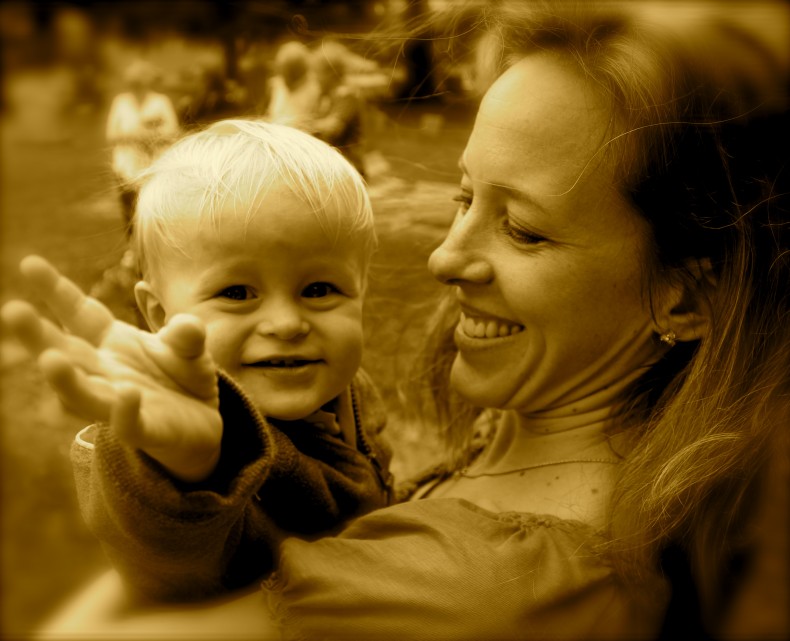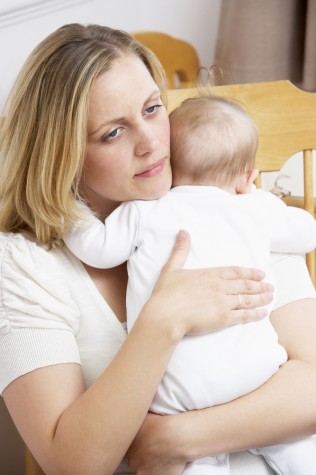 The moment of my son’s birth is seared into my brain, but fogginess reigns in the aftermath. Our hospital stay is a series of blurry memories: broken sleep, a jaundiced and hungry newborn, and me crying while scarfing down a few forkfuls of food in my spare moments alone. Once home, I didn’t immediately feel the deep bond that most mothers develop with their infants. He was so fragile, I felt unequipped to care for him — but what kind of mom feels that lack?
The moment of my son’s birth is seared into my brain, but fogginess reigns in the aftermath. Our hospital stay is a series of blurry memories: broken sleep, a jaundiced and hungry newborn, and me crying while scarfing down a few forkfuls of food in my spare moments alone. Once home, I didn’t immediately feel the deep bond that most mothers develop with their infants. He was so fragile, I felt unequipped to care for him — but what kind of mom feels that lack?
I judged myself against other mothers. It seemed everyone cared for their babies better than did I. They had secret ways to jiggle a baby asleep and entire repertories of nursery songs at the ready. I cared for my son, but something was off. Where was my satisfaction? Where was our joy?
 I now know what was preventing me from bonding with my newborn — postpartum depression. PPD is a major depressive disorder which affects up to 20 percent of mothers after they give birth, though the condition is considered to be widely underreported. Although no one knows the precise cause, there are many contributing factors that can lead a woman to experience PPD and some of these are physiological changes related to pregnancy itself.
I now know what was preventing me from bonding with my newborn — postpartum depression. PPD is a major depressive disorder which affects up to 20 percent of mothers after they give birth, though the condition is considered to be widely underreported. Although no one knows the precise cause, there are many contributing factors that can lead a woman to experience PPD and some of these are physiological changes related to pregnancy itself.
* * *
After giving birth, my hormones underwent the magnificent shifts typical of the postpartum period — my estrogen levels fell from fifty times their background level down to normal within a few days, and within a week-and-a-half my progesterone plummeted from ten times its normal. These hormonal fluctuations account for what’s known as the baby blues, which affect around 50 percent of postpartum women. While the baby blues may also spur cases of PPD, some experts say that in most instances these hormonal shifts alone, or a patient’s sensitivity to them, can’t fully account for the more powerful and long-lived form of depression known as PPD. In general, baby blues last from a few days to a few weeks. But PPD can drag on for months and even years. I honestly can’t discern the border between my own baby blues and depression.
In hindsight I see that I had most of the risk factors for PPD. First, there were our breastfeeding problems, which were a source of great anxiety and stress. I never produced more than half the milk my son needed and so for weeks I futzed with slipping neonatal feeding tubes into his tiny mouth while he nursed me, so that we could prolong breastfeeding. He received supplemental formula through the tube. Every time I mixed his formula, a knife turned in my heart. That opaque lifeless white liquid was an eight-times-per-day reminder of all the ways in which I saw myself as failing miserably as a mother: I couldn’t even make milk, the most basic gift from mother to baby.
Second and third were my weak social support system and stressful major recent life changes. In the nine months before I became pregnant, my husband and I had moved to a new city where we knew no one and we’d gotten married. I helped him cold-start his private dental practice, while also completing my first book. We’d hardly had time for each other much less to make new friends.
Fourth, I have a short history of depressive episodes. While I don’t consider myself a depressed person, I have gone through time-limited periods of the blues and was in counseling for disordered eating in my twenties. I’d also had months of broken sleep both before and after having my son. Fierce indigestion during pregnancy, along with pain in my hips conspired to chop my sleep into chunks of one to two hour stretches in my last trimester. After he was born, breastfeeding around the clock meant that I didn’t sleep for more than two or three hours at a time for more than six months. All in all, it was nine or ten months of not sleeping through the night.
Last, we were going through a high level of financial stress. Our pregnancy was a surprise, though in no way unwanted. However, we didn’t have a maternity rider on our health insurance and I feared I’d placed our family at risk of further monetary hardship.
* * *
After our son arrived, my stress and fears gave way to an unfamiliar emptiness. There were days where I swung from elated to melancholy like a dandelion in the breeze. Some days were golden. Other days I felt saturated by despair. I was often angry. I cried when alone in the shower and wiped tears from behind sunglasses while walking my baby outdoors. I became confused easily, and my attention span shrank to a few minutes. Forgetfulness set up shop in my brain and refused to leave. Though I was unaware at the time, all are classic hallmarks of PPD.
In those early months, I denied my depression partly because I didn’t want to admit something was amiss, that I was imperfect. But I also feared a depression diagnosis would mean I’d be pressured, or forced, to take antidepressants; and I assumed this necessitated ceasing breastfeeding, which I’d fought for tooth and nail. I’d hidden an eating disorder for years; it was second nature to hide this too.
Despite my state of mind, I took on writing projects and worked part-time in my husband’s business. But when a big problem with a large writing project surfaced, it seemed insurmountable. I began to envision shooting myself in the backyard or leaping from a tall bridge where the Blue Ridge Parkway crosses Interstate-26 south of town.
I vividly remember watching my husband and baby in bed together one morning and feeling an intense sadness that I had to leave them. I didn’t want to leave them; I felt I had to leave them.
The envisioned scenarios scared me to my core. Part of me knew they wouldn’t spur action, but why was I having them in the first place?
At my mother’s urging, I phoned my doctor. She swiftly got me on antidepressants and into psychoanalysis psychotherapy, the standard treatment for PPD. My son was weaned; he was six months old. While there was a certain measure of relief in starting therapy, I also struggled mightily to understand what was going on.
After more than a month of medication, I felt vastly better. As my mind cleared, therapy helped me identify the multiple stress factors that had accrued over the past year and I learned some useful coping mechanisms. My therapist also helped me to understand that having PPD is not a character weakness, as a friend had opined. Like many mental health issues, postpartum depression is subject to stigma and I felt its stinging wound keenly.
* * *
But even after emotional normalcy returned, my fractured attention span and memory lapses continued until after my son’s first birthday. As I got better, I couldn’t help wondering what on earth had happened to me.
What brought on my postpartum depression? Might inflammation have been a trigger? Inflammation is hypothesized to be an underlying cause of general depression, and some recent research has begun to explore whether it acts to magnify the additional risk factors associated with postpartum depression. Pregnant women near term are known to have higher levels of inflammation than nonpregnant women; and the pain of childbirth followed by the demands of caring for a newborn and disturbed sleep can exacerbate inflammation even more. (I’ve wondered too if the Mirena IUD I’d had placed six weeks postpartum may have contributed, because around ten percent of all women, even those who are not postpartum, who use the Mirena report feeling depressed as a side effect.)
In my case, it felt like my brain changed. This sensation wasn’t something imaginary, my brain function very likely did change. In a study where new mothers who were depressed were compared to happy new mothers, the down-in-the-dumps mums had out-of-whack hypothalmic-pituitary-adrenocortical axes. (The HPA axis describes interactions between three endocrine glands which regulate emotions and control a person’s stress response.) In a separate study using functional magnetic resonance imaging, women with PPD were found to have altered neural processing.
* * *
Today, my brain no longer feels addled. I’m no longer medicated, and no longer in counseling. As my son approaches two, I’ve reflected on my pendulum ride from feeling a sense of detachment with him as an infant to living in a borderless landscape of love and appreciation. It fascinates me to help him explore his world. I love his weight on my left hip as I cook, and I could happily watch all morning long as his tiny hands learn sign language.
It’s true that I still have moments of frustration and feeling down. But these are now tiny islands in a larger and more benign ocean. I feel robbed of my first six months with my baby because everything then was warped by the prism of depression. But this fosters an even greater sense of appreciation for the days we share now. Most importantly, I’ve reclaimed the me I used to be, the me I’ve always been, except for those mind-binding few months.
____________
Editor’s Note: May is Mental Health Awareness Month.
____________
DeLene Beeland is a freelance writer and author living in Asheville, N.C. Her book The Secret World of Red Wolves: The Fight to Save North America’s Other Wolf was released by UNC Press in 2013. She is a correspondent for the Charlotte Observer’s Sci-Tech pages and her work has appeared in Slate.com, Science NOW, ScientificAmerican.com, and OnEarth.com. You can find her on twitter, or at her blog Wild Muse. PHOTOS courtesy of D. Beeland and via Shutterstock
PPD is a serious problem and so many women suffer from it that don’t need to. We should bring ppd out in the open and feel the ability to talk about it with others and do what we can to get through it.
I have written about the physiology behind PPD and PPP.
My perspective is that it is “normal”, that is normal as process, that physiology is reacting “normally” to an abnormal situation. When people are experiencing PPD or PPP, what they need is transportation to competent medical professionals who know how to deal with PPD and PPP and keep everyone “safe”. People with PPD or PPP are not able to do that for themselves.
http://daedalus2u.blogspot.com/2007/08/low-nitric-oxide-acute-psychosis.html